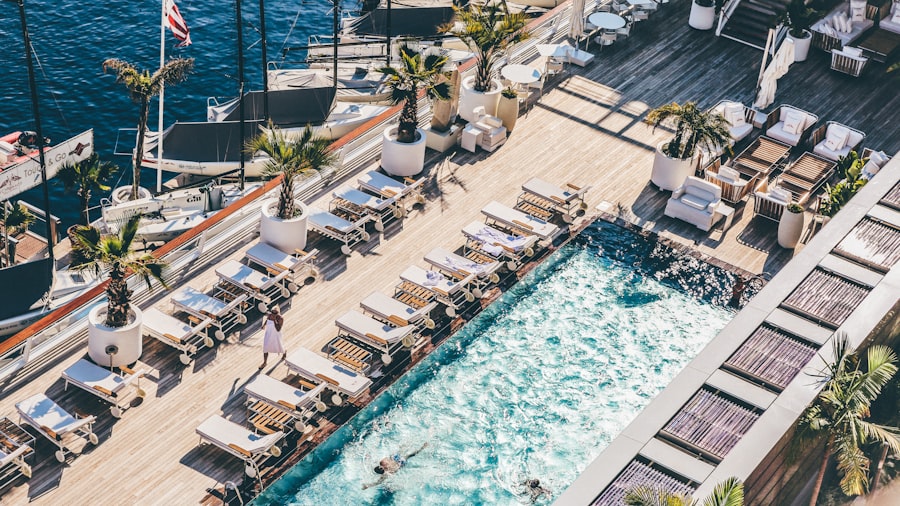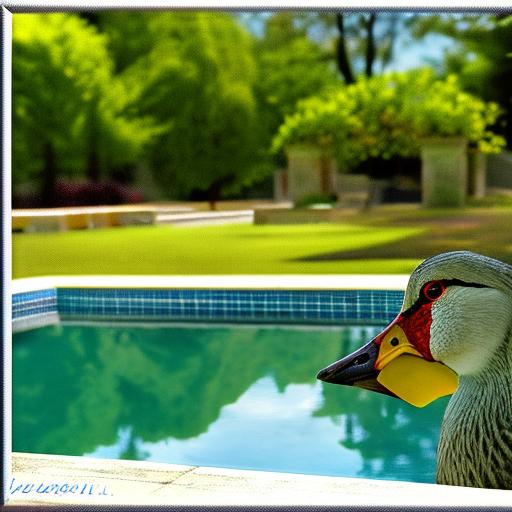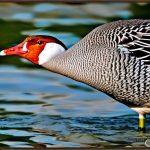Geese are a common sight in many areas, and they are known for their attraction to bodies of water, including pools. These large birds are drawn to pools because they provide a source of water for drinking and bathing. Additionally, pools often have surrounding grassy areas that geese find appealing for grazing. While it may be entertaining to watch geese swim in a pool, it is important to keep them away from your pool for several reasons.
Firstly, geese droppings can pose health risks to humans. Their droppings contain bacteria that can contaminate the water and cause illnesses such as E. coli and salmonella. This is especially concerning if you have children who enjoy swimming in the pool. Secondly, geese can cause damage to pool equipment and the surrounding area. Their sharp claws can scratch and puncture pool covers, liners, and other components. Additionally, their constant presence can lead to excessive grass damage and unsightly droppings around the pool.
Key Takeaways
- Geese are attracted to pools because they provide a source of water and food.
- Geese can cause damage to pool equipment and create unsanitary conditions.
- Building physical barriers and installing pool covers are effective prevention measures.
- Decoys, repellents, and natural barriers can also deter geese from your pool.
- Maintaining a clean pool environment and seeking professional help can further prevent geese from becoming a problem.
Understanding the risks and problems of geese in your pool
The presence of geese in your pool can pose significant health risks. Geese droppings contain bacteria such as E. coli and salmonella, which can contaminate the water and make it unsafe for swimming. These bacteria can cause gastrointestinal illnesses, skin infections, and respiratory problems if ingested or inhaled. Children are particularly vulnerable to these health risks, as they are more likely to accidentally swallow pool water while swimming.
In addition to health risks, geese can also cause damage to your pool equipment and surroundings. Their sharp claws can scratch and puncture pool covers, liners, and other components. This can lead to costly repairs or replacements. Furthermore, their constant presence can result in excessive grass damage around the pool area. Geese graze on grass and can quickly strip it down to bare soil, leaving unsightly patches and making it difficult for the grass to recover.
Prevention measures: Building physical barriers around your pool
One effective way to keep geese away from your pool is by building physical barriers. There are several types of barriers to consider, each with its own pros and cons.
Fencing is a common option for keeping geese out of pool areas. A sturdy fence with small gaps between the bars can prevent geese from entering. However, it is important to ensure that the fence is tall enough to deter geese from flying over it. Additionally, the fence should be buried at least a foot into the ground to prevent geese from digging underneath it.
Another option is installing netting or mesh around the pool area. This can be an effective way to keep geese out, as they are unable to pass through the small openings. However, it is important to regularly inspect and maintain the netting or mesh to ensure that there are no holes or gaps that geese can exploit.
Installing pool covers to keep geese away
Using pool covers is another effective method for keeping geese away from your pool. Pool covers not only prevent geese from accessing the water, but they also provide additional benefits.
One of the main benefits of using pool covers is that they can help maintain water quality by preventing debris and contaminants from entering the pool. This is particularly important when it comes to geese droppings, as they can introduce harmful bacteria into the water. By covering the pool when it is not in use, you can minimize the risk of contamination and reduce the need for excessive cleaning and chemical treatments.
There are different types of pool covers available, including solid covers and mesh covers. Solid covers completely block out sunlight and prevent any debris from entering the pool. Mesh covers, on the other hand, allow water to pass through while keeping out larger debris. Both types of covers can effectively deter geese, so it ultimately comes down to personal preference and specific needs.
Using decoys and repellents to deter geese from your pool
Decoys and repellents can be effective tools for deterring geese from your pool area. There are several options to consider, each with its own advantages and disadvantages.
Decoys are objects that resemble geese and are placed in the pool area to scare away real geese. Common decoys include plastic or wooden replicas of geese, as well as motion-activated decoys that mimic the movement of real geese. The presence of these decoys can create a sense of danger for geese, causing them to avoid the area.
Repellents, on the other hand, are substances that are applied to the pool area to make it unappealing to geese. There are various types of repellents available, including chemical repellents and natural repellents. Chemical repellents often contain ingredients that emit an odor or taste that is unpleasant to geese. Natural repellents, on the other hand, use ingredients such as garlic or peppermint oil to deter geese.
It is important to note that while decoys and repellents can be effective in deterring geese, they may not provide a long-term solution. Geese can become accustomed to decoys over time, and some may even learn to ignore certain types of repellents. Therefore, it is recommended to use these methods in conjunction with other prevention measures for optimal results.
Creating a natural barrier with plants and landscaping

Plants and landscaping features can be used to create a natural barrier that deters geese from your pool area. There are several types of plants and landscaping features that can be effective in keeping geese away.
Tall grasses and shrubs can act as a physical barrier that makes it difficult for geese to access the pool area. These plants provide cover and make geese feel less secure, discouraging them from approaching. Additionally, planting dense shrubs or hedges along the perimeter of the pool area can create a visual barrier that geese are less likely to attempt to cross.
Another option is to incorporate plants that geese find unappealing into your pool area. Geese prefer to graze on short, tender grass, so planting taller, coarser grasses can deter them. Additionally, geese dislike plants with strong scents or prickly textures. Incorporating plants such as lavender, rosemary, or holly can help keep geese at bay.
Using sound and light to keep geese at bay
Sound and light can be effective deterrents for keeping geese away from your pool area. There are several options available that utilize sound and light to deter geese.
One option is to use ultrasonic devices that emit high-frequency sounds that are unpleasant to geese. These devices are typically motion-activated and can be placed around the pool area to deter geese from approaching. The high-frequency sounds are inaudible to humans but can be highly effective in deterring geese.
Another option is to use laser lights or strobe lights that emit bright, flashing lights. Geese are sensitive to sudden changes in light and may be startled or disoriented by these lights. By placing these lights around the pool area, you can create a visually unappealing environment for geese.
It is important to note that while sound and light can be effective deterrents, they may not provide a long-term solution. Geese can become accustomed to certain sounds or lights over time, so it may be necessary to periodically change the type or location of these deterrents for optimal results.
Maintaining a clean and unappealing pool environment for geese
Keeping your pool area clean and unappealing to geese is an important step in preventing them from accessing your pool. There are several tips you can follow to maintain a clean and unappealing pool environment.
Regularly clean up any debris or food scraps around the pool area. Geese are attracted to areas with a ready food source, so by removing any potential food sources, you can make your pool area less appealing to geese. Additionally, regularly remove any geese droppings from the pool area to minimize the risk of contamination.
It is also important to regularly maintain your pool equipment and surroundings. Repair any damage to pool covers, liners, or other components that may provide access points for geese. Additionally, regularly inspect and maintain any physical barriers or deterrents that you have in place to ensure their effectiveness.
Seeking professional help to remove geese from your property
If you are unable to effectively deter geese from your pool area using prevention measures, it may be necessary to seek professional help for geese removal. There are several options available for geese removal, depending on the severity of the problem and local regulations.
One option is to hire a professional wildlife control company that specializes in geese removal. These companies have the knowledge and experience to safely and effectively remove geese from your property. They may use methods such as trapping and relocation or harassment techniques to deter geese from returning.
Another option is to contact local authorities or wildlife agencies for assistance. They may be able to provide guidance or resources for dealing with geese on your property. It is important to check local regulations regarding geese removal, as some areas may have specific guidelines or restrictions in place.
Conclusion and final tips for keeping geese out of your pool
In conclusion, keeping geese away from your pool is important for both health and maintenance reasons. Geese droppings can contaminate the water and pose health risks, while their presence can cause damage to pool equipment and surroundings. By implementing prevention measures such as building physical barriers, using pool covers, and utilizing decoys and repellents, you can effectively deter geese from your pool area.
Additionally, creating a natural barrier with plants and landscaping, using sound and light deterrents, and maintaining a clean pool environment can further discourage geese from accessing your pool. If all else fails, seeking professional help for geese removal may be necessary. By following these tips and taking proactive measures, you can enjoy a geese-free pool area and ensure the safety and cleanliness of your pool.
If you’re looking for more information on how to keep geese out of your pool, you might also be interested in learning about the different coop sizes needed for chickens. Poultry Wizard has a helpful article on “How Big Does a Coop Need to Be for a Chicken?” that provides insights into creating the perfect living space for your feathered friends. Understanding the appropriate coop size can help ensure the safety and comfort of your chickens while keeping them away from your pool. Check out the article here for more details.
FAQs
What are some common problems caused by geese in pools?
Geese can cause a variety of problems in pools, including leaving droppings, damaging pool covers, and potentially spreading diseases.
What are some effective ways to keep geese out of my pool?
Some effective ways to keep geese out of your pool include using decoys, installing pool covers, using motion-activated sprinklers, and using reflective tape or balloons.
Are there any humane ways to keep geese out of my pool?
Yes, there are several humane ways to keep geese out of your pool, such as using decoys or reflective tape. It is important to avoid using harmful or lethal methods.
What should I do if I find geese in my pool?
If you find geese in your pool, it is important to avoid approaching them or trying to remove them yourself. Contact a professional wildlife removal service for assistance.
How can I prevent geese from returning to my pool?
To prevent geese from returning to your pool, it is important to regularly clean up any droppings and to continue using deterrents such as decoys or reflective tape. It may also be helpful to remove any sources of food or water that may be attracting the geese.
Meet Walter, the feathered-friend fanatic of Florida! Nestled in the sunshine state, Walter struts through life with his feathered companions, clucking his way to happiness. With a coop that’s fancier than a five-star hotel, he’s the Don Juan of the chicken world. When he’s not teaching his hens to do the cha-cha, you’ll find him in a heated debate with his prized rooster, Sir Clucks-a-Lot. Walter’s poultry passion is no yolk; he’s the sunny-side-up guy you never knew you needed in your flock of friends!







